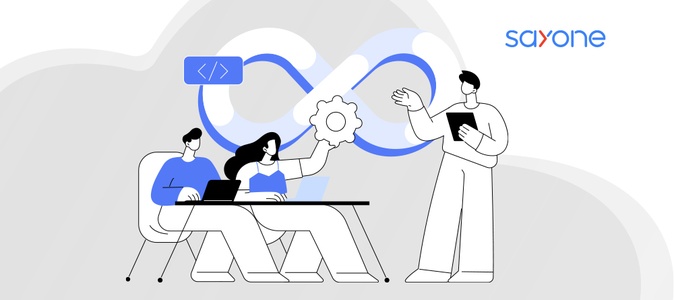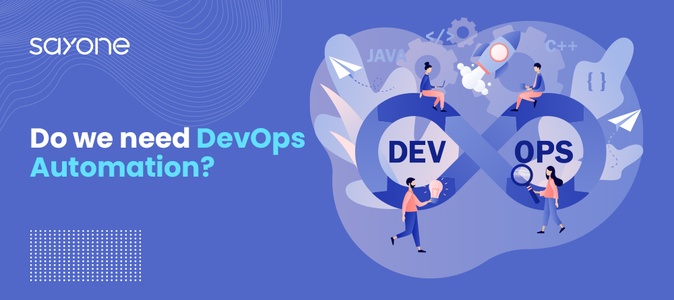How Can a DevOps Team Take Advantage of Artificial Intelligence (AI)?

Share This Article
Do we need DevOps automation?
Table of Contents
Subscribe to Our Blog
We're committed to your privacy. SayOne uses the information you provide to us to contact you about our relevant content, products, and services. check out our privacy policy.
What is DevOps?
DevOps is an approach that combines software development and IT operations. It aims to shorten the development cycle while delivering high-quality outputs. With an emphasis on collaboration and automation, DevOps helps speed up processes, thereby making teams more responsive to changes.
What is AI?
Artificial Intelligence (AI), on the other hand, is the development of computer systems that can perform tasks that usually require human intelligence. These tasks include problem-solving, speech recognition, and learning. In the tech industry, AI is often used to analyze large sets of data, automate tasks, and optimize various aspects of operations.
The Convergence of DevOps and AI
Interest in mixing AI with DevOps is growing rapidly. Both technologies aim to make processes more effective. DevOps brings speed and automation to software development and IT operations. Meanwhile, AI offers smart data analysis and predictive capabilities. By bringing the two together, there is a potential to revamp the entire life cycle of software development and operations.
The integration of AI into DevOps is creating a buzz for good reasons. AI can help automate complex tasks, analyze data to predict issues, and even improve security protocols. With this integration, operations become smarter, faster, and more adaptive.
The Importance of AI in DevOps
AI is not just a trendy term in the tech world; it has a practical role in DevOps. It helps simplify complex processes and offers data-driven insights that manual approaches can't match. If you think AI is just about chatbots and voice recognition, think again. In the realm of DevOps, AI contributes to everything from automating tests to predicting system failures, thus acting as a cornerstone for modern practices.
Shifting from Traditional Methods to AI-Infused Processes
The old methods of DevOps, which relied heavily on manual configurations, scripts, and constant human monitoring, are evolving. Now, artificial intelligence is stepping in to automate repetitive tasks and provide predictive analytics. Imagine not having to sift through logs and metrics manually because AI can highlight the problem areas for you. This shift isn't just about doing things faster; it's about doing them smarter.
- Automated Testing: With AI, gone are the days of labor-intensive script writing for each test scenario. AI-powered testing tools can understand the application and generate tests on the fly.
- Predictive Analytics: AI algorithms can analyze data patterns to foresee and alert about potential system issues, thereby preventing outages before they happen.
- Security: Advanced algorithms can now spot inconsistencies in data patterns, serving as an early warning system against cyber threats.
Automated Testing and AI: Accelerating the DevOps Cycle
Artificial Intelligence (AI) is changing the game in automated testing within the DevOps framework. Traditional testing methods often involve lengthy procedures that can slow down the development cycle. AI, however, can process vast amounts of data quickly to identify bugs or performance issues. This rapid analysis reduces the testing phase's duration, allowing for quicker deployments.
Real-World Instances of AI in Automated Testing
- Anomaly Detection: Some companies have employed AI algorithms that can quickly spot inconsistencies in code behavior. By doing this, the system can immediately flag potential issues, allowing teams to address them promptly.
- Regression Testing: In DevOps, updating one feature can accidentally disrupt another. AI can predict the ripple effects of a change and conduct targeted tests, thus reducing the overall testing burden.
By incorporating AI into the testing process, DevOps teams not only expedite their workflows but also add a layer of precision that might be hard to achieve otherwise. Thus, AI's role in automated testing is not just about speed but also about improving the quality of the final product.
Predictive Analytics for Operational Efficiency
Artificial Intelligence is transforming how DevOps teams analyze data. Through machine learning algorithms, AI can sift through vast amounts of data in a fraction of the time it would take a human. These algorithms can identify patterns and correlations that might not be apparent at first glance. This adds a new layer of depth to data interpretation, helping DevOps teams to make more informed decisions.
Anticipating Issues and Bottlenecks
One of the most vital roles predictive analytics plays is in foreseeing potential operational hiccups. By analyzing past and current data, AI algorithms can predict system failures, slowdowns, or other bottlenecks that may disrupt the workflow. When these predictions are made, teams can take preventive action, fixing issues before they escalate into more significant problems. This proactive approach minimizes downtime and keeps the development and deployment process running smoothly.
Through AI's role in data analytics and its capability to predict potential issues, DevOps teams can optimize operational efficiency. This not only saves time but also resources, contributing to a more streamlined and effective workflow.
Streamlining the Deployment Pipeline with AI
Artificial Intelligence (AI) is proving to be a game-changer in the world of DevOps, especially when it comes to streamlining the deployment pipeline.
Here's how:
Aiding Continuous Integration with AI
AI tools are designed to recognize patterns, enabling them to identify errors during the continuous integration process rapidly. This rapid error detection allows developers to make immediate corrections, thereby minimizing disruptions. Through pattern recognition and data analysis, AI provides real-time feedback, ensuring that the integration process is smoother and less error-prone.
Checkout the Best Continuous Integration Tools for DevOps
Improving Deployment Efficiency with AI
One of the challenges in the deployment process is predicting how changes will impact the overall system. With AI, predictive models can forecast potential bottlenecks or failures. This allows teams to anticipate issues and make the necessary adjustments before deploying.
By doing so, AI minimizes the risks associated with deployment, ensuring a more reliable release. AI's predictive capabilities combined with automation tools can also optimize the allocation of resources, making the entire deployment process faster and more reliable.
Incorporating AI into the DevOps process can lead to more reliable deployments, fewer errors, and quicker feedback loops, all of which are crucial for businesses aiming to stay agile and competitive.
Checkout DevOps VS Agile: Which one to choose & Why
AI in Monitoring and Alerts
For DevOps Engineers, monitoring systems in real-time is crucial to catch issues before they escalate. AI plays a pivotal role in this context. It not only helps in keeping a continuous watch over operations but also in understanding patterns, predicting potential problems, and even self-healing in some advanced models.
- Real-time Monitoring Through AI: The integration of AI into DevOps monitoring tools allows these systems to predict and notify teams of issues, often before they occur. By analyzing data patterns, AI can identify abnormalities and performance spikes, alerting teams instantaneously. This reduces downtime and improves system reliability.
- Improving Alerting Mechanisms: Traditional alert systems can sometimes flood teams with irrelevant or redundant alerts, causing alert fatigue. AI-driven alerting systems analyze patterns, prioritize alerts based on urgency, and even suggest potential fixes. This results in fewer false positives and more actionable alerts, helping teams to react quickly and effectively.
With these capabilities, AI is transforming the way DevOps teams monitor and respond to system alerts, making the entire process more proactive rather than reactive.
Security Enhancements through AI
One of the biggest challenges in the DevOps cycle is maintaining security. Traditional methods often need to be revised in scanning for vulnerabilities quickly and accurately. That's where AI tools come into play. They can sift through extensive data and code to pinpoint potential weaknesses. This enables DevOps teams to take timely corrective actions and makes the system more secure.
Automated Responses to Security Risks
Equally important is the ability to respond swiftly to any security threats. With AI algorithms monitoring network activities, they can instantly identify and isolate abnormal patterns or behaviors. Once detected, AI can trigger automatic countermeasures like blocking IP addresses or quarantining affected files. This immediacy is crucial, as it helps mitigate the impact of the threat before it becomes a severe problem.
AI's role in enhancing DevOps security isn't just futuristic talk; it's happening now. The technology is already aiding DevOps teams in identifying vulnerabilities and responding quickly to security threats. It brings a new layer of security that's smart, timely, and more effective.
Challenges and Considerations in AI-DevOps Integration
While the integration of AI into DevOps offers numerous benefits, it's crucial to be aware of the challenges and ethical considerations involved.
Limitations in Integration
- Complexity: Introducing AI into a DevOps setup can complicate the system architecture. Teams need to adjust to new tools and frameworks, which can cause a learning curve.
- Costs: AI implementations are not cheap. Whether it's the cost of new software or the price of specialized training, budgets can skyrocket.
- Data Quality: AI relies on data, but not all data is useful or accurate. Poor data quality can lead to faulty decisions, affecting the DevOps cycle.
- Algorithmic Bias: AI systems can manifest biases present in their training data or their designers. This bias can affect everything from automated testing results to security vulnerability scans.
- Data Privacy: AI systems need access to large sets of data to operate optimally. This opens up concerns regarding data security and compliance with privacy laws.
Recognizing these limitations and ethical issues is the first step towards responsibly implementing AI in a DevOps environment. It's crucial for teams to assess the risks and decide if the potential benefits are worth tackling these challenges.
Looking to Outsource your DevOps process ? read the pros & cons here
Summing Up the Essentials
- Automated Testing: AI helps speed up the testing process, making it more accurate.
- Predictive Analytics: AI plays a role in identifying potential issues before they become real challenges.
- Deployment and Monitoring: AI is making strides in streamlining deployment pipelines and real-time system monitoring.
- Security: AI helps in threat detection and initiating rapid responses.
What Lies Ahead?
The integration of AI in DevOps is still in its nascent stages but shows great promise for more effective and reliable operations. Expect a stronger symbiosis between AI technologies and DevOps methodologies in the coming years. This union promises to revolutionize DevOps teams' operations, making systems more reliable and easier to manage.
Act Now for a More Productive DevOps Cycle!
Interested in adopting AI in your DevOps process? At SayOneTech, our expertise in integrating AI with DevOps can simplify your operations and make them more productive. Contact us today to find out how we can help you optimize your DevOps activities.
Share This Article
Subscribe to Our Blog
We're committed to your privacy. SayOne uses the information you provide to us to contact you about our relevant content, products, and services. check out our privacy policy.

